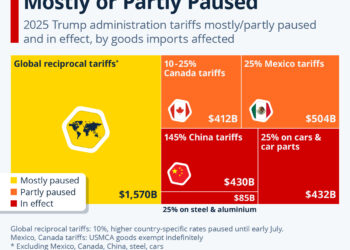- Harvard claims federal demands infringe upon academic freedom.
- Some Harvard faculty members have already filed lawsuits against the Trump administration.
- The federal government has suspended funding for several universities.
On Monday, Harvard University firmly rejected multiple demands from the Trump administration, arguing that these requests would grant the government undue influence over the institution, which they believe is being misrepresented as excessively liberal.
Shortly after Harvard issued its statement, the Trump administration announced a suspension of $2.3 billion in federal funding allocated to the university.
This funding freeze follows the administration’s prior announcement that it was examining $9 billion in federal contracts and grants awarded to Harvard, part of a broader initiative targeting what it alleges is rising antisemitism on college campuses, particularly during pro-Palestinian demonstrations over the past year and a half.
A task force from the Department of Education, aimed at addressing antisemitism, accused Harvard, the nation’s oldest university, of fostering a “problematic entitlement culture” that is prevalent in elite universities, suggesting they do not view federal investment as a responsibility that includes upholding civil rights laws.
This exchange intensifies an ongoing confrontation between the Trump administration and some of the wealthiest academic institutions, raising critical questions about freedom of speech and academic independence.
The administration has withheld hundreds of millions of dollars in federal aid to various universities, insisting that these institutions must amend their policies while accusing them of not adequately combating antisemitism on their campuses.
Deportation actions have begun against some foreign students detained who participated in pro-Palestinian protests, while the visas of many others have been revoked.
In a public letter on Monday, Harvard’s President Alan Garber asserted that the demands from the Department of Education would allow the federal government to “control the Harvard community” and jeopardize its “core values as a private institution dedicated to knowledge creation, dissemination, and pursuit.”
“No government—regardless of its political party—should dictate what private universities can teach, whom they admit or hire, and which academic inquiries they can undertake,” Garber stated.
Nevertheless, he acknowledged the need to address allegations of antisemitism, stating, “While we stand firm in defense of Harvard, we will persist in fostering a robust culture of open inquiry on our campus, equipping our community with the necessary tools and skills to engage constructively, and expanding our intellectual and viewpoint diversity.”
Concerns about campus antisemitism resurfaced prior to Trump’s second term, following pro-Palestinian protests at multiple universities last year.
White House spokesperson Harrison Fields remarked on Monday that Trump is committed to “making higher education great again” by eliminating unchecked antisemitism and ensuring that taxpayer dollars do not support racial discrimination or violence.
In a letter released last Friday, the Department of Education criticized Harvard for “not meeting the intellectual and civil rights standards that justify federal investment.”
The department’s letter demanded that Harvard diminish the influence of faculty, staff, and students who prioritize activism over scholarship, and have an external panel review each department to ensure “viewpoint diversity.”
By August, Harvard must ensure that faculty hiring and student admissions are merit-based, ceasing any preferences based on race, color, or national origin. The university is also required to screen international students to prevent the admission of those who oppose American values and to report any breaches of conduct to federal immigration authorities.
Last week, a group of Harvard professors filed a lawsuit to halt the Trump administration’s review of the nearly $9 billion in federal contracts and grants received by the university.
Reports indicate that the Trump administration may also seek to compel Columbia University, another Ivy League institution, into a consent decree binding it to observe federal guidelines regarding antisemitism. Similar to Harvard, some Columbia professors have taken legal action in response. The government has already suspended $400 million in funding and grants for Columbia.
President Garber emphasized that the federal government’s request for Harvard to “audit” the perspectives of students, faculty, and staff to identify leftist thinkers opposed to the Trump administration represents a clear violation of the university’s First Amendment rights.
“The university will not compromise its independence or surrender its constitutional rights,” Garber asserted.
He reiterated that while Harvard is taking measures to tackle antisemitism on campus, “these objectives cannot be realized through the exertion of power devoid of legal basis to control teaching and learning at Harvard and dictate our operational approach.”
Garber concluded, “Freedom of thought and inquiry, along with the government’s long-standing commitment to respect and uphold it, have allowed universities to contribute significantly to a free society and improve the lives of people globally.”
In January, Harvard agreed to enhance protections for Jewish students as part of a settlement addressing two lawsuits claiming that the university had become a center for antisemitism.
To mitigate any financial strain resulting from potential cuts to federal funding, Harvard is considering borrowing $750 million from financial markets.





